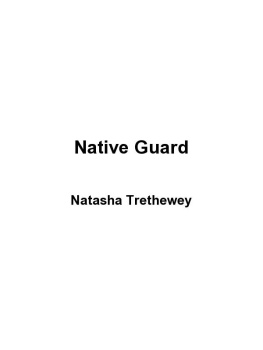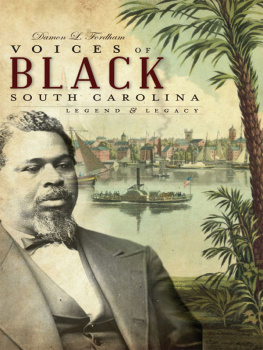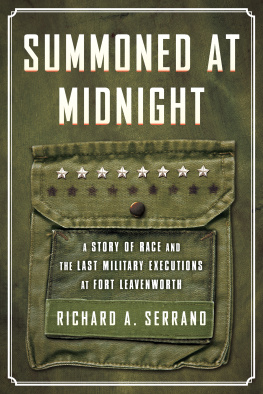First Mariner Books edition 2007
Copyright 2006 by Natasha Trethewey
ALL RIGHTS RESERVED
For information about permission to reproduce
selections from this book, write to Permissions,
Houghton Mifflin Company, 215 Park Avenue South,
New York, New York 10003.
Visit our Web site: www.hmhbooks.com.
The Library of Congress has cataloged the print edition as follows:
Trethewey, Natasha D., date.
Native guard / Natasha Trethewey.
p. cm.
Includes bibliographical references.
ISBN -13: 978-0-618-60463-0
ISBN -10: 0-618-60463-4
1. United StatesHistoryCivil War, 18611865
Participation, African AmericanPoetry. 2. African
American soldiersPoetry. 3. Racially mixed
peoplePoetry. 4. Interracial marriagePoetry.
5. MississippiPoetry. 6. MothersPoetry. I. Title.
PS 3570. R 433 N 38 2006
811'.6dc22 2005010649
ISBN -13: 978-0-618-87265-7 (pbk.)
ISBN -10: 0-618-87265-5 (pbk.)
eISBN : 978-0-547-41632-8
v2.0612
Excerpt from "Meditation on Form and Measure" from Black Zodiac
by Charles Wright. Copyright 1997 by Charles Wright.
Reprinted by permission of Farrar, Straus and Giroux, LLC.
For my mother, in memory
Memory is a cemetery
I've visited once or twice, white
ubiquitous and the set-aside
Everywhere under foot...
CHARLES WRIGHT
THEORIES OF TIME AND SPACE
You can get there from here, though
there's no going home.
Everywhere you go will be somewhere
you've never been. Try this:
head south on Mississippi 49, one
by-one mile markers ticking off
another minute of your life. Follow this
to its natural conclusiondead end
at the coast, the pier at Gulfport where
riggings of shrimp boats are loose stitches
in a sky threatening rain. Cross over
the man-made beach, 26 miles of sand
dumped on the mangrove swampburied
terrain of the past. Bring only
what you must carrytome of memory,
its random blank pages. On the dock
where you board the boat for Ship Island,
someone will take your picture:
the photographwho you were
will be waiting when you return.
I
I'm going there to meet my mother
She said she'd meet me when I come
I'm only going over Jordan
I'm only going over home
Traditional
THE SOUTHERN CRESCENT
1
In 1959 my mother is boarding a train.
She is barely sixteen, her one large grip
bulging with homemade dresses, whisper
of crinoline and lace, her name stitched
inside each one. She is leaving behind
the dirt roads of Mississippi, the film
of red dust around her ankles, the thin
whistle of wind through the floorboards
of the shotgun house, the very idea of home.
Ahead of her, days of travel, one town
after the next, and Californiaa word
she can't stop repeating. Over and over
she will practice meeting her father, imagine
how he must look, how different now
from the one photo she has of him. She will
look at it once more, pulling into the station
at Los Angeles, and then again and again
on the platform, no one like him in sight.
2
The year the old Crescent makes its last run,
my mother insists we ride it together.
We leave Gulfport late morning, heading east.
Years before, we rode together to meet
another man, my father, waiting for us
as our train derailed. I don't recall how
she must have held me, how her face sank
as she realized, again, the uncertainty
of it allthat trip, too, gone wrong. Today,
she is sure we can leave home, bound only
for whatever awaits us, the sun now
setting behind us, the rails humming
like anticipation, the train pulling us
toward the end of another day. I watch
each small town pass before my window
until the light goes, and the reflection
of my mother's face appears, clearer now
as evening comes on, dark and certain.
GENUS NARCISSUS
Faire daffadills, we weep to see
You haste away so soone.
ROBERT HERRICK
The road I walked home from school
was dense with trees and shadow, creek-side,
and lit by yellow daffodils, early blossoms
bright against winter's last gray days.
I must have known they grew wild, thought
no harm in taking them. So I did
gathering up as many as I could hold,
then presenting them, in a jar, to my mother.
She put them on the sill, and I sat nearby
watching light bend through the glass,
day easing into evening, proud of myself
for giving my mother some small thing.
Childish vanity. I must have seen in them
some measure of myselfthe slender stems,
each blossom a head lifted up
toward praise, or bowed to meet its reflection.
Walking home those years ago, I knew nothing
of Narcissus or the daffodils' short spring
how they'd dry like graveside flowers, rustling
when the wind blewa whisper, treacherous,
from the sill. Be taken with yourself,
they said to me; Die early, to my mother.
GRAVEYARD BLUES
It rained the whole time we were laying her down;
Rained from church to grave when we put her down.
The suck of mud at our feet was a hollow sound.
When the preacher called out I held up my hand;
When he called for a witness I raised my hand
Death stops the body's work, the soul's a journeyman.
The sun came out when I turned to walk away,
Glared down on me as I turned and walked away
My back to my mother, leaving her where she lay.
The road going home was pocked with holes,
That home-going road's always full of holes;
Though we slow down, time's wheel still rolls.
I wander now among names of the dead:
My mother's name, stone pillow for my head.
WHAT THE BODY CAN SAY
Even in stone the gesture is unmistakable
the man upright, though on his knees, spine
arched, head flung back, and, covering his eyes,
his fingers spread across his face. I think
grief, and since he's here, in the courtyard
of the divinity school, what he might ask of God.
How easy it is to read this body's language,
or those gestures we've come to knowthe raised thumb
that is both a symbol of agreement and the request
for a ride, the two fingers held up that once meant
victory, then peace. But what was my mother saying
that day not long before her deathher face tilted up
at me, her mouth falling open, wordless, just as
we open our mouths in church to take in the wafer,
meaning communion? What matters is context
the side of the road, or that my mother wanted
something I still can't name: what, kneeling,
my face behind my hands, I might ask of God.
PHOTOGRAPH: ICE STORM, 1971
Why the rough edge of beauty? Why
the tired face of a woman, suffering,
made luminous by the camera's eye?
Or the storm that drives us inside
for days, power lines down, food rotting
in the refrigerator, while outside
the landscape glistens beneath a glaze
of ice? Why remember anything
but the wonder of those few days,
the iced trees, each leaf in its glassy case?
The picture we took that first morning,
the front yard a beautiful, strange place
why on the back has someone made a list
of our names, the date, the event: nothing
of what's insidemother, stepfather's fist?
WHAT IS EVIDENCE
Not the fleeting bruises she'd cover
with makeup, a dark patch as if imprint
of a scope she'd pressed her eye too close to,
looking for a way out, nor the quiver
in the voice she'd steady, leaning
into a pot of bones on the stove. Not
Next page









